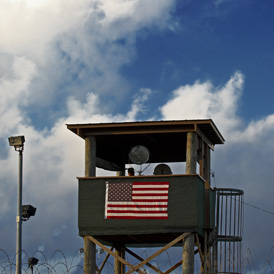Obama restarts military trials at Guantanamo
President Obama announces the resumption of military trials at Guantanamo Bay. Sarah Smith says he’s effectively admitting that he cannot carry through plans to close the camp.

Barack Obama has announced that military trials can resume at the Guantanamo detention camp two years after he vowed to close the prison and try its detainees in US federal courts. The US President also issued an order to continue holding prisoners who have not been charged or convicted but are deemed to pose a threat to US security.
In January 2009, on his first day in the White House, Mr Obama had suspended all military trials. Officials say he’s still committed to eventually closing the prison.
American human rights groups have expressed their disappointment at the move. Hina Shami, a director at the American Civil Liberties Union said the Obama administration had “chosen to institutionalise unlawful, indefinite detentions and to revive illegitimate military commissions, which will do nothing to remove the stain on America’s reputation that Guantanamo represents.”
President Obama made a big point of dramatically announcing his intention to close Guantanamo Bay on his very first day in office, writes our Washington Correspondent, Sarah Smith.
It was statement that was meant to set the tone for his entire presidency and tell the world how he intended to be a very different American leader from George W Bush.
By announcing that he will allow military trials to go ahead at the camp, he is now effectively admitting that he will not be able to close the notorious facility. A pretty embarrassing U-turn. And not the first from the Obama administration over the war on terror.
Of course all the people who supported Bush administration policies are gloating. They are delighted that Obama has found it much harder than he thought to reverse their terror agenda.
An editorial in the Wall Street Journal today says: "No one has done more to revive the reputation of Bush-era anti-terror policies than the Obama Administration."
So how much has America's pursuit of the War on Terror really changed since President Obama took office?
He did renounce an end to torture. Under his government no prisoners at Guantanamo are being water-boarded. All those "enhanced interrogation techniques" that the Bush administration considered to be legal are now outlawed.
But Obama disappointed many when he refused to even consider prosecuting those people who has authorized such mistreatment.
Human rights don't seem to be the number one consideration when we look at the other ways Obama's America is fighting "terror".
Obama has vastly increased the number of air attacks by unmanned drones over Afghanistan, Pakistan, Yemen and beyond. The Government admits very few high value terrorist suspects are killed in these attacks, and everyone accepts civilian causalities are inevitable, but Obama seems deeply committed to this tactic.
And whilst no-one is suggesting he has been tortured, the plight of the accused Wiki-leaker - Private First Class Bradley Manning - during his detention in a military brig asks a lot of questions about what is considered reasonable treatment in Obama's America.
This week we found out that he is forced to sleep without clothes and then stand naked for inspection in front of his cell every morning. The military has decided he could potentially harm himself with the elastic in his underpants - but Manning isn't even on suicide watch because no doctor actually believes he is a danger to himself.
The US Congress had blocked the President’s plan to transfer some terrorism suspects – including Khalid Sheikh Mohammed, accused of being the architect of the September 11 attacks – from Guantanamo to civilian courts.
Administration officials said the President was still committed to closing the prison and that Congress resistance to civilian trials would undermine US counter-terrorism efforts. They said regular reviews would be held into every prisoner’s detention. Mr Obama said the steps would “broaden our ability to bring terrorists to justice, provide oversight for our actions and ensure the humane treatment of detainees.”
There are still 172 detainees held at Guantanamo Bay in Cuba, with about three dozen set for prosecution in either US criminal courts or military commissions.